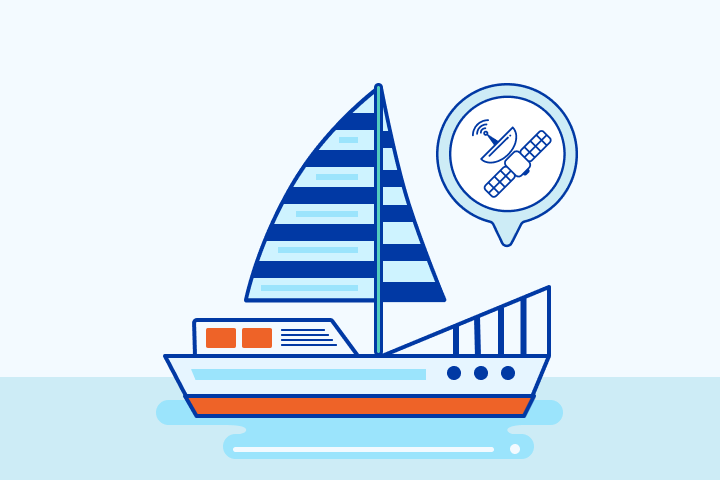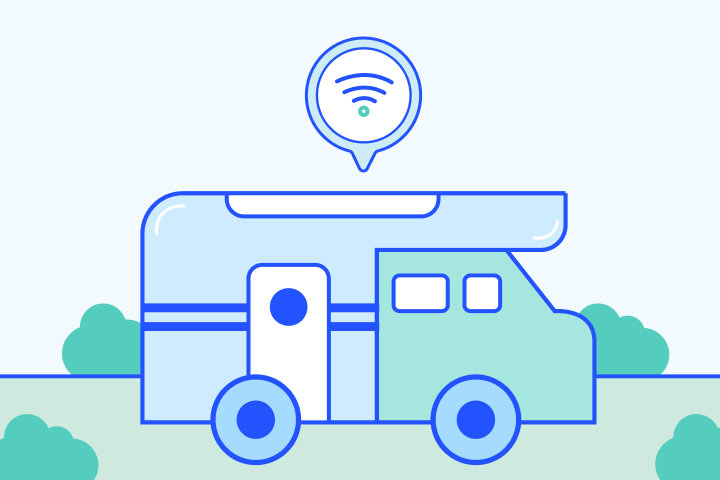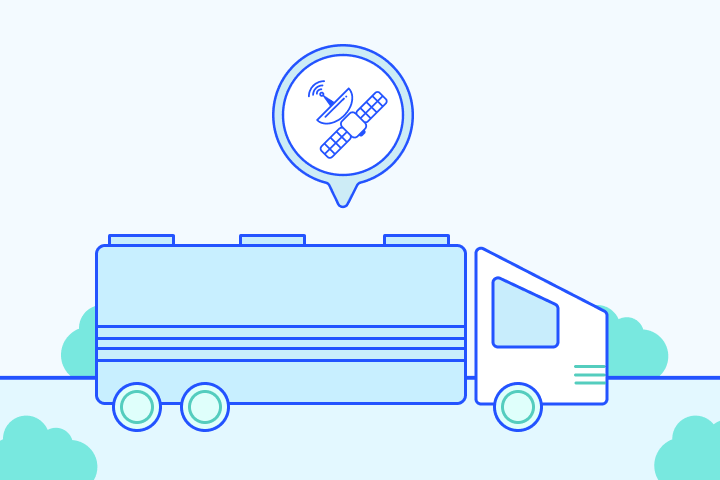Best Internet Options for Boats and Yachts 2026

HighSpeedOptions prides itself on providing honest, quality content. While we may be compensated when you make a purchase through links on our site, all opinions are our own. Here's how we make money.
Table of Contents
Boat internet is all about reliability. You might get blazing speeds at the dock, then struggle to get a connection five minutes after you leave the marina. The good news: there is a best option, but it depends on how you boat, how many people need to connect, and whether you need offshore coverage or just dependable service when you’re cruising along the coast.
This guide breaks down the best boat internet options (satellite internet, hotspots, marina Wi-Fi, and 5G options), plus practical setup tips to help you stay connected within budget.
Key Takeaways: Finding Internet Options for Your Boat
- If you stay close to shore, a cellular hotspot or a 5G router is usually the best value.
- If you need consistent internet offshore, Starlink Maritime is the best internet experience for most boaters.
- If you prioritize reliability over speed while offshore, BGAN can be a dependable global communications option at much lower speeds.
- If you live on your boat, the most stable approach is a hybrid setup: satellite internet, cellular, and a Wi-Fi booster for marina or dock public Wi-Fi.
Quick Picks: Best Internet for Boats
- Best overall: Starlink Maritime has the best blend of coverage and modern performance for boaters who need internet while beyond cellular range.
- Best nearshore budget: Cellular hotspot or phone tethering are the lowest-cost and easiest to set up options when near shore.
- Best offshore reliability (basic comms anywhere): BGAN (L-band satellite) is slow (450 Kbps), but it’s designed for dependable global connectivity.
- Best backup (safety-first): Garmin inReach is ideal for emergency communications and two-way messaging when you want a dependable lifeline while offshore.
- Best for living aboard: A hybrid approach: Starlink internet, 5G hotspot, and a Wi-Fi booster for marina or dock public Wi-Fi.
- Best for weekenders: Marina Wi-Fi booster when docked, a hotspot when underway; they’re simple and affordable.
How to Choose Boat Internet
Your choice of internet service on your boat or yacht depends on how you use your vessel and what your internet needs are while aboard. Keep these three questions in mind as you research and compare internet options:
What are your on-board internet needs?
- Email, navigation, weather, light browsing: a mobile hotspot, smartphone tethering, or marina Wi-Fi can be enough
- Streaming and video calls: you’ll want a stronger nearshore cellular setup or satellite
- Remote work + uploads + always-on connectivity: plan for a hybrid stack
How many devices and how many people need access?
If you’re connecting multiple phones, TVs, laptops, or smart devices, a router-based setup, such as a cellular router or a Wi-Fi router that’s connected to satellite internet, is usually more stable than a single hotspot.
Are you boating near the shore or offshore?
This may be the biggest driver of your boat’s internet options selection. You don’t have to be too far offshore to be out of range of stable and reliable internet service.
Nearshore vs. Offshore Internet for Boats and Yachts
If you boat near the coast, you have several options. If you’re frequently out at sea, you have a couple of options. Once you know your internet options, you can choose the solution that suits your needs and budget.
Nearshore (lakes, rivers, coastal cruising)
- Your best options are usually cellular (hotspot or 4G/5G router)
- Performance depends on coverage, congestion, and antenna placement
- A marine router and external antenna can improve and stabilize performance
Offshore (beyond a consistent cell signal)
You’re generally choosing between:
- LEO (low Earth orbit) satellite internet, such as Starlink Maritime, for real broadband service
- L-band satellite (BGAN) for reliable two-way communications at much lower speeds
Nearshore is about optimizing what coverage you can access, whereas offshore is a tech choice, needs, and budget issue.
Best Internet Options for Boats and Yachts
1) Cellular hotspot (4G/LTE): easiest and cheapest nearshore coverage
What it is: A portable hotspot device (or phone hotspot) that uses 4G or LTE to create a Wi-Fi network onboard.
Coverage: Nearshore only and when you’re within range of a cellular network. While 5G is expanding, 4G/LTE currently has more coverage.
Best for: Weekend trips, inland boating, coastal cruising near populated areas.
What you need:
- A hotspot device (or phone) and a cellular data plan
- A charging or power cable
- Optional: an external antenna or booster if the signal is weak
Why people like it:
- Quick setup and no installation
- Much lower cost compared to marine satellite
- Works well for email, maps, and light streaming when the signal is strong
Where it falls short:
- If you’re below deck, the signal can be weak
- Network congestion in the marina can drag down speeds
- Becomes unreliable as you move out of range
Pro tip:
Place the hotspot as high as possible, near a window, and avoid enclosing it in cabinets or below deck. You can also optimize a hotspot to improve speeds.
Verdict: A cellular hotspot is the best low-cost nearshore option; upgrade to a router or add an antenna if you boat often and want more reliable connectivity.
2) 5G hotspot or 5G gateway: fast when it’s available
What it is: A hotspot or gateway that uses 5G cellular data to power onboard Wi-Fi when you’re within a strong 5G coverage area.
Coverage: Nearshore only, and coverage can vary while you’re on the water.
Best for:
Boaters who stay near metro areas or coastal corridors with strong 5G signal access.
What you need:
- A 5G hotspot or gateway and a 5G cellular data plan
- A decent place for the device, such as near a window or as high above the deck as possible
- Optional: An LTE fallback plan or device for continuity
Why people like it:
- It has high-speed potential in strong 5G areas
- It’s better for streaming video and video calls than LTE when the conditions are right
- It’s simple to use and often plug-and-play
Where it falls short:
- 5G coverage can fade quickly once you leave populated areas
- Its speeds vary based on network congestion and the signal strength
- It is not a dependable offshore internet solution
Pro tip: Treat 5G as your high-speed internet option when you’re within coverage, not your only connection. Keep LTE available as a backup for when the 5G signal drops.
Verdict: 5G hotspots are excellent options for nearshore performance in the right places, but not a coverage guarantee.
3) Marine cellular router and external antennas: the nearshore quality upgrade
What it is: A dedicated marine router (often dual-SIM capable) paired with externally mounted antennas to pull a stronger cellular signal and distribute Wi-Fi onboard.
Coverage: Nearshore focused; it improves reception but still depends on a cellular signal. Some systems have up to a 20-mile range in ideal conditions.
Best for: Frequent nearshore cruising, families, crews, and anyone tired of spotty hotspot connectivity.
What you need:
- A marine cellular router and a data plan (ideally a dual-SIM and multi-carrier model)
- External antennas, mounts, and cabling
- Basic network setup (Wi-Fi network name (SSID) and password) and optional onboard router integration)
Why people like it:
- It has better reception than a hotspot inside the cabin
- It has better reliability while moving
- You can set up a shared Wi-Fi network for multiple devices
Where it falls short:
- As with most devices, it’s still limited by tower coverage and network congestion
- You may need to mount it and run some cabling
- It’s more expensive than a hotspot or smartphone tethering
Pro tip: Mount the antennas as high as possible and where they are least obstructed; a multi-carrier and dual-SIM device provides the best reliability.
Verdict: A marine router with an antenna is the best nearshore option; it’s ideal if you cruise often and want permanent onboard Wi-Fi.
4) Marina Wi-Fi + booster: dockside internet with realistic expectations
What it is: Using the marina’s public Wi-Fi as your upstream connection, plus a Wi-Fi booster or bridge to better capture weak dock signals and share them onboard.
Coverage: Docked only, and the performance depends on the quality of the marina network.
Best for: Spending time on your boat while docked, those who live aboard, or those who want to limit their cellular or satellite data use.
What you need:
- A Wi-Fi booster or bridge that is marine-rated (preferred)
- Optimal mounting placement to acquire a steady signal
- Optional: an onboard router to distribute Wi-Fi throughout the boat
Why people like it:
- It’s often the cheapest option while docked
- It can reach weak dock signals and reduce onboard dead zones
- It’s useful as one layer in a hybrid internet setup for your boat
Where it fails:
- It is limited by an overloaded marina Wi-Fi network
- Its performance varies by time of day (peak hours are often the slowest)
- It isn’t consistently reliable for work calls at many marinas
Pro tip: Use the marina Wi-Fi for downloads and software updates, and use cellular or satellite for anything that is time sensitive.
Verdict: Great internet option while you’re docked, but don’t rely on it as your only connection.
5) Starlink Maritime: the closest thing to home internet offshore
What it is: A LEO (low Earth orbit) satellite internet service designed for when you’re at sea and out of range of public Wi-Fi and cellular networks, or for those who live on their boats full-time and want fast and reliable internet when no other options exist.
Coverage: Global maritime coverage, including international waters, with proper equipment and a clear view of the sky.
Best for: Offshore cruisers, remote workers, and those who live aboard who need real broadband beyond cell range.
What you need:
- Starlink Maritime hardware and a mounting solution
- Power and wiring that support always-on operation
- Onboard router or network gear to connect multiple devices
Why people like it:
- It’s a modern broadband experience while you’re offshore, offering download speeds up to 400 Mbps, depending on equipment, plan, and signal clarity
- It’s a strong primary internet option
Where it falls short:
- The upfront and monthly cost can be significant (hardware starts around $1,999, and plans start at $250/mo for 50GB priority data)
- Once you use all of your priority data, Starlink may throttle internet speeds as low as 1 Mbps download and 0.5 Mbps upload
- It requires stable mounting and a clear view of the sky for the best results
Pro tip: Use cellular while you are near shore to conserve satellite priority data and as a failover.
Verdict: Best overall broadband internet solution while you’re offshore or need faster speeds than you can get from cellular networks or public Wi-Fi, but keep hardware costs, power, and the data plan in mind for your budget.
6) BGAN (L-band satellite): global comms, but not broadband
What it is: BGAN (Broadband Global Area Network) is an L-band satellite communications service built for dependable global connectivity and essential data meant for reliable communications rather than for broadband internet.
Coverage: Global coverage and designed for reliability in remote areas.
Best for: Offshore reliability, basic connectivity anywhere, and mission-focused or emergency communications.
What you need:
- A BGAN terminal and service plan through a provider
- A clear sky view
- A low-bandwidth mindset; it isn’t fast but good enough for email, small software updates, and essential communications
Why people like it:
- It’s reliability-first design is ideal for remote coverage
- It is useful for essential updates and communications
- It’s a strong backup and emergency option alongside other more robust internet solutions
Where it falls short:
- It isn’t suitable for streaming or modern work calls
- It is slow, with speeds up to 492 Kbps, depending on the service and equipment
- Plan pricing and structures vary widely by provider and usage
Pro tip: Position BGAN as an always-connected essentials connection, not your primary boat Wi-Fi for everyday internet.
Verdict: Best for global reliability at low speeds and essential communications, but not for broadband needs.
7) Emergency/backup devices: not internet, but still useful for mariners
What it is: Compact satellite communicators that prioritize SOS and low-bandwidth messaging when your primary internet options fail.
Coverage: Global coverage for safety-first communications, depending on the device and service.
Best for: A safety-first backup layer when everything else drops, especially while offshore or remote cruising.
What you need:
- A satellite communicator and an active subscription so that those aboard know how to use it
- A tested contact and SOS plan
- A charging plan and backup batteries
Why people like it:
- It is designed for emergencies and essential communication
- The Garmin inReach is commonly used for SOS and two-way messaging
- The Iridium GO has very limited bandwidth (around 2.4 kbps), but it has global basic comms
Where it falls short:
- It isn’t usable for normal internet tasks
- Limited bandwidth means it is slow with minimal capabilities
- It requires setup and practice to be useful during stressful emergencies
Pro tip: Test it before you need it: send a message, confirm delivery, and make sure everyone onboard understands SOS steps and how to use the device.
Verdict: The best last line of communication; it is not an internet or Wi-Fi option for your boat, but it is absolutely worth it for offshore safety and communications.
Comparing Internet Options for Boats and Yachts
| Option | Best for | Typical speed | Offshore range | Power draw | Setup difficulty | Verdict |
| Mobile hotspot (4G/LTE) | Weekend trips, inland, casual nearshore | Varies by coverage and congestion | Nearshore only | Low | Easy | Cheapest nearshore solution, but not reliable offshore. |
| 5G hotspot or gateway | Fast nearshore in strong 5G areas | Varies; but high speed potential | Nearshore only | Low–Moderate | Easy | Great nearshore speed; limited by coverage. |
| Marine router and antennas | Better stability and shared onboard Wi-Fi | Varies (often more stable than a phone) | Up to20 mile range in ideal conditions | Moderate | Medium | Best nearshore option for reliability. |
| Marina Wi-Fi and booster | Docked internet, liveaboard marina life | Varies (marina dependent) | Dock only | Low–Moderate | Medium | Great when dock Wi-Fi is decent; booster helps capture signal. |
| Starlink Maritime | Offshore broadband for work and streaming | Up to 400 Mbps (policy applies) | Global maritime | Moderate–High | Medium–Hard | Best overall offshore broadband internet, but budget for hardware and plan. |
| BGAN (L-band) | Reliable global comms | Up to 492 Kbps | Global | Low–Moderate | Medium | Reliability-first global option; not broadband living. |
| inReach or Iridium GO | Safety backup (SOS and messaging) | Very low bandwidth | Global | Low | Easy | Not boat Wi-Fi; use as your always works fallback layer. |
| Option | Mobile hotspot (4G/LTE) |
| Best for | Weekend trips, inland, casual nearshore |
| Typical speed | Varies by coverage and congestion |
| Offshore range | Nearshore only |
| Power draw | Low |
| Setup difficulty | Easy |
| Verdict | Cheapest nearshore solution, but not reliable offshore. |
| Option | 5G hotspot or gateway |
| Best for | Fast nearshore in strong 5G areas |
| Typical speed | Varies; but high speed potential |
| Offshore range | Nearshore only |
| Power draw | LowâModerate |
| Setup difficulty | Easy |
| Verdict | Great nearshore speed; limited by coverage. |
| Option | Marine router and antennas |
| Best for | Better stability and shared onboard Wi-Fi |
| Typical speed | Varies (often more stable than a phone) |
| Offshore range | Up to20 mile range in ideal conditions |
| Power draw | Moderate |
| Setup difficulty | Medium |
| Verdict | Best nearshore option for reliability. |
| Option | Marina Wi-Fi and booster |
| Best for | Docked internet, liveaboard marina life |
| Typical speed | Varies (marina dependent) |
| Offshore range | Dock only |
| Power draw | LowâModerate |
| Setup difficulty | Medium |
| Verdict | Great when dock Wi-Fi is decent; booster helps capture signal. |
| Option | Starlink Maritime |
| Best for | Offshore broadband for work and streaming |
| Typical speed | Up to 400 Mbps (policy applies) |
| Offshore range | Global maritime |
| Power draw | ModerateâHigh |
| Setup difficulty | MediumâHard |
| Verdict | Best overall offshore broadband internet, but budget for hardware and plan. |
| Option | BGAN (L-band) |
| Best for | Reliable global comms |
| Typical speed | Up to 492 Kbps |
| Offshore range | Global |
| Power draw | LowâModerate |
| Setup difficulty | Medium |
| Verdict | Reliability-first global option; not broadband living. |
| Option | inReach or Iridium GO |
| Best for | Safety backup (SOS and messaging) |
| Typical speed | Very low bandwidth |
| Offshore range | Global |
| Power draw | Low |
| Setup difficulty | Easy |
| Verdict | Not boat Wi-Fi; use as your always works fallback layer. |
Recommended Boat Internet Setups by Boating Style
Below are what we recommend for internet options for your boat, based on how you use it. If you boat offshore, we recommend that you have a layered setup. Use your phone when near shore and are within cell range, but have a backup, like a marine router or a satellite communicator, at least for emergencies. You may not need a layered setup if you only boat near metro areas or where you have consistent access to cellular networks.
Weekend boater (simple and affordable)
- Use a 4G, LTE, or 5G hotspot or your smartphone’s hotspot while underway
- Use the marina’s public Wi-Fi when you’re docked with an optional booster if the signal is weak
Coastal cruiser (reliable nearshore Wi-Fi for the whole boat)
- Use a marine cellular router with external antennas for optimal connectivity
- Use your hotspot (a device or the one on your smartphone) as a backup
- Use a Wi-Fi booster when you’re docked
Offshore cruiser (internet that still works after cell signal disappears)
- Starlink Maritime is the most robust broadband internet option for boats; use it as your primary connection
- Use a cellular router or hotspot when you’re nearshore to conserve satellite data
- If you don’t have Starlink Maritime, consider a satellite communication device, such as the Garmin inReach, for essential and emergency communications
Liveaboard (highest stability day-to-day)
- Use Starlink maritime, a cellular router, and a marina booster for comprehensive connection options
- Have a failover should any of your sources drop
Choosing the Right Internet Options for Boats and Yachts
The best boat internet plan is the one that matches how you actually boat and what your internet needs are. If you’re mostly near shore, a hotspot or a marine router may be all you need. If you cruise offshore, want broadband internet, or need reliable internet for remote work, satellite internet is your best option for high-speed internet anywhere. If you do boat offshore, we recommend having a device, such as a basic satellite communicator, for safety reasons.
Frequently Asked Questions About Boat and Yacht Internet Options
Yes, you can. Depending on your location and needs, you can use mobile hotspots, satellite internet, 5G connections, and portable satellite terminals like BGANs to get internet access on your vessel.
Satellite internet is the most reliable choice for offshore and international boating. Services like Starlink Maritime offer global coverage with high speeds, but they can be expensive.
Yes, as long as you are close to shore. Mobile hotspots rely on your cellular provider’s coverage and may not work far offshore. They’re ideal for lakes, rivers, or coastal cruising.
5G internet can work near shore where infrastructure is available, but it generally doesn’t extend far into open water. Coverage may be spotty or unavailable in remote marine areas.
Mobile hotspots are typically the most affordable and easiest to set up. They’re a great option for casual use near shore but may not be reliable offshore.
Starlink Maritime is worth it if you work remotely, stream, or need offshore broadband. But be aware that you have limited priority data with each plan. Once you use your priority data, your connection speeds will be throttled, sometimes as low as 1 Mbps.
A BGAN (Broadband Global Area Network) is a portable satellite terminal that provides global internet and voice service. It’s great for critical communication but comes with high upfront and data costs, and speeds are limited.
Yes. Even if you have internet access, it’s wise to carry a handheld satellite communicator like the Garmin inReach. It allows for emergency SOS alerts and GPS messaging in case of equipment failure or lack of connectivity.
Find providers in your area

Table of Contents





